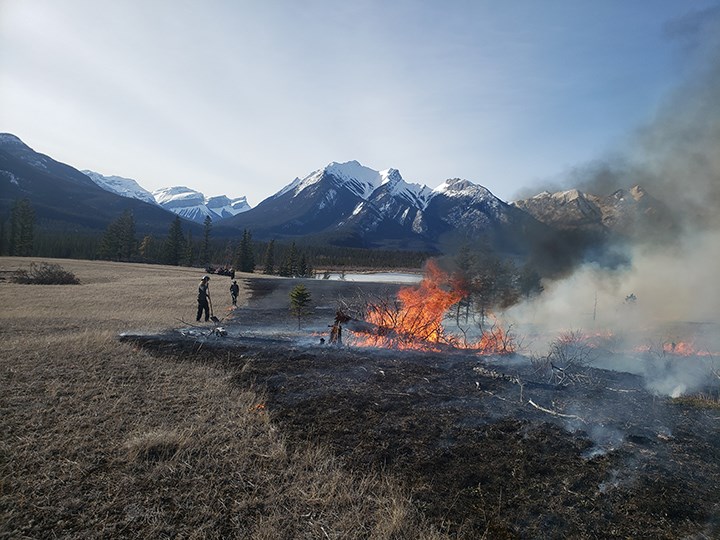
Scott Hayes, Local Journalism Initiative Reporter | [email protected]
One look at the weather forecast can tell a hot story. According to Environment and Climate Change Canada (ECCC), Jasper is going to have a lot of sun over the next several days, and there’s a low chance of rain.
With summer comes heat, and that means heat waves – more than two days at or above 29 C with overnight lows of 14 C or higher in Jasper National Park – with a real possibility of wildfires.
Jasper recorded its highest temperature of 41.2 C on June 30, 2021, beating the previous record by several degrees set nearly a century ago and during the same week. More than a year has since passed, and the closest that the thermometer has come to that was only 29.9 C on July 12, just a week ago.
ECCC meteorologist Kyle Fougère said the possibility of another heatwave or heat dome still exists, though it’s difficult if not impossible to predict.
“When we're looking at heat waves, we've got quite good forecast accuracy out to about seven days,” Fougère said. “After about seven days, you start to see the accuracy drop. We only make a seven-day forecast, because the accuracy isn't quite high enough for us to feel comfortable in forecasting numbers out that far.”
Beyond a seven-day forecast, meteorologists tend to rely on seasonal forecasts, which in turn use historical data for four three-month periods of the year based off of data from a 30-year climatology study that ran from 1980 to 2009.
“For the July/August/September period, we are expecting temperatures to be above normal,” Fougère said.
There are limitations in that ECCC can’t say how much above normal it will be. It could be 2 C, 6 C or higher.
With the news that the United Kingdom is currently experiencing its highest-ever recorded temperatures that have resulted in a surge of fires, there is much valid concern regarding “new normal” temperatures and the cause-and-effect relationship that they have on wildfires in Jasper.
This past week, the fire danger rating went to “Very High,” according to Parks Canada’s Fire Information page. There isn’t a fire ban at the moment, only regular fire restrictions, but with hot, dry weather comes an inherently increased risk of a spark setting off a blaze.
Katie Ellsworth, fire management officer in Jasper National Park, explained that the wildfire season in this province runs from March 1 to Oct. 31.
She said that the Canadian Forest Service provides fire managers with a seasonal outlook. Their original forecast was for a slower, wetter spring transitioning to a slow, cool start to the summer season.
“That's pretty much what we've seen. It was a pretty long burn until we got to nice summer weather, and that's really only shown up in the last week or two here,” she said.
“The rest of the seasonal fire danger ratings for Canada, and for Jasper, it does suggest that we will see this trend continuing in that warm, dry summer: more typical summer conditions. We can expect that those will heighten the fire danger rating in Jasper National Park and more than likely throughout the rest of Western Canada.”
She added that she was “heartened” by the fact that British Columbia hasn’t had a significant fire season in 2022, unlike recent years.
Caroline Charbonneau, wildfire information officer for the Edson Forest Area, warned how people tend to become more relaxed when there is cooler, wetter weather, which leads them to take more risks.
“It's like any other year: things can change really quickly, within a matter of three or four days if it's really warm, especially if it's windy, or fine fuels dry up,” Charbonneau said.
“We can be in a higher fire danger quite quickly.”
She described how people keep taking risks even when the daytime temperatures build and the fine fuels – the needles, the twigs, or branches and even the grass – can dry up. The combination of those two can have dangerous results, so vigilance is of the utmost importance.
“I think what we want folks to know is just pay close attention when the weather warms up and keep watching your surroundings,” Charbonneau said.
“Always have something to put out the fire if it's within your ability. If you're having a campfire, make sure you have a bucket of water and a shovel. Make sure you put it on flat ground. Keep it protected from the wind. Build itself a little barrier. Don't burn when it's windy.”
She added that more than half of the province’s wildfires are reported by the public and by industry. Anyone who sees smoke or fire should call 310-FIRE (3473) immediately. If that fire is an immediate threat to people’s safety, call 911.
Fougère said that people need to remember these numbers, because heatwaves are becoming more frequent as global warming continues causing further climate change, as demonstrated by last year’s heat dome.
“When we are having heat waves, they're getting to be more severe, which was certainly illustrated last year with the extreme heat event that we had across Alberta and British Columbia,” he added.



